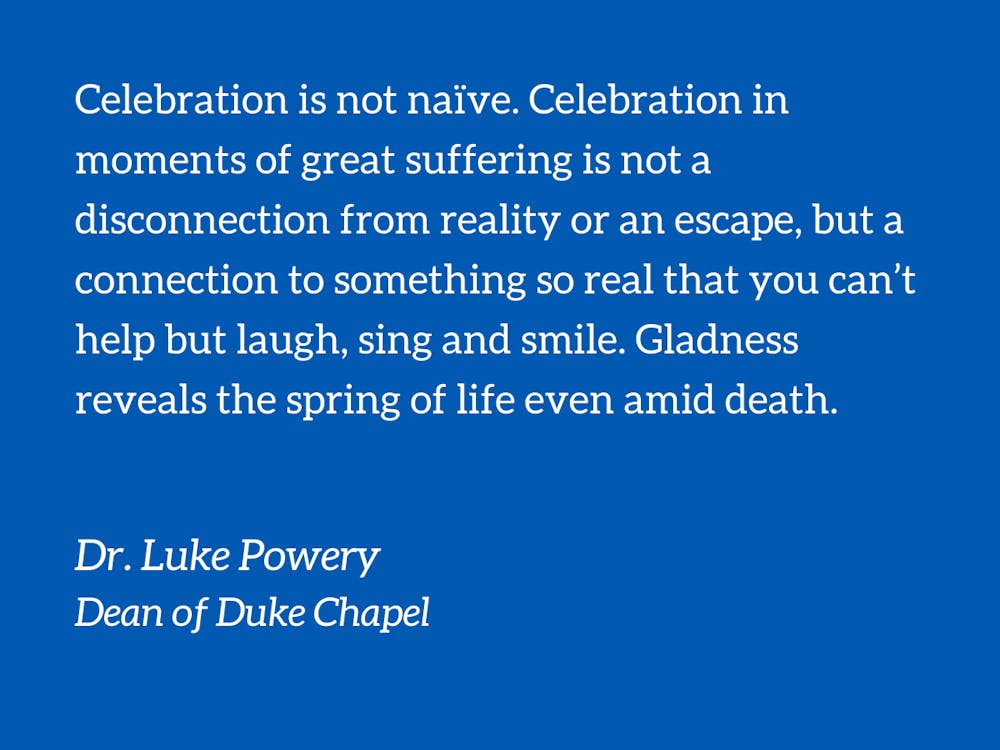In a severely impoverished community, in one of the largest shantytowns in Nairobi, Kenya, the Shangilia Children’s Home is an orphanage for formerly homeless children. Over twenty years ago, I was there with a group of pastors from Europe, the Middle East and Africa. We sat in the courtyard as the children recited scripture, sang religious and cultural songs, played instruments, danced and performed other acrobatic tricks. The children repeated a phrase we hear in churches throughout the world — “God is good, all the time, and all the time, God is good.”
At Shangilia, which means literally “to receive with joy and enthusiasm,” I observed an authentic expression of deep gladness when that should have been the last thing expected in this kind of situation. These little children smiled. They clapped. They had every reason to be sad, even mad or fearful, due to the socioeconomic and political context. Yet they celebrated.
Celebrating may seem out of touch with “real life” with the ongoing injustices of war and innocent bloodshed, but a deep wisdom reveals otherwise. Poet Jack Gilbert says it this way: “We must risk delight. We can do without pleasure, but not delight. Not enjoyment. We must have the stubbornness to accept our gladness in the ruthless furnace of this world.”
Gladness amid madness is what we see in the history of the fiery furnace of the enslavement of Black peoples. Anthropologist Zora Neale Hurston reminds us of this in her book “Sanctified Church” with its description of High John de Conqueror, a hero in African American folklore. High John was the embodiment of “a whisper, a will to hope.” He walked with a musical rhythm on a “singing-drum” or “the waves of sound.” “The sign of this man was a laugh, and his singing-symbol was a drum-beat.” He was the slaves’ “hope-bringer.”
In one story about High John, there was a plantation where the work was extremely hard and the Old Massa (the master) was very mean. High John told everybody, “What we need is a song.” So, he, along with other slaves, went on a trip to search for a song without the master seeing them leave. They traveled to heaven where the Old Maker (God) called them to his “great workbench, and made them a tune and put it in their mouths. It had no words. It was a tune that you could bend and shape…” In other words, God gave them a song. And when they returned to the plantation, the master was in a horrible mood, but High John reminded the enslaved that they had something “finer than [the] plantation” within themselves. He said, “Us got all that, and [the master] don’t know nothing at all about it.” They broke out in singing, and “the day didn’t seem hot like it had before…[and] the work flew.”
The story of High John reveals that celebration can be a form of secret resistance to the status quo or any form of oppression. In tough times throughout history, celebratory singing could be heard on the streets of Haiti after a devastating earthquake. Celebratory singing could be heard on the streets of Soweto, South Africa, as the people fought for freedom during apartheid. Celebratory singing could be heard in the streets of El Salvador as people suffered under the cruel hand of militarism.
Celebration is not naïve. Celebration in moments of great suffering is not a disconnection from reality or an escape, but a connection to something so real that you can’t help but laugh, sing and smile. Gladness reveals the spring of life even amid death. Celebratory practices can be eudaimonic expressions of resistance to daily trauma and cruelty. Celebration can be a refusal to be buried by burdens, a mode of attunement to life, and an expression of gratitude for it. It can be a reminder that one should be grateful to be seen and not viewed.
So as we begin a new academic year, I offer a humble challenge to the Duke community to find ways to celebrate. Don’t hesitate to do it. Don’t allow trauma and pain, which are surely real, to become a terror reigning over your life. There is more to life than lamentation. There is also celebration.
Celebrate new friendships, new ideas, new experiences and new opportunities. Celebrate each new day. Celebrate with one another and celebrate one another. Laugh, sing, dance and shout. You are here. You are alive. Let’s celebrate that and so much more!
The Rev. Dr. Luke A. Powery is Dean of Duke University Chapel. His column typically runs on alternate Mondays.
Get The Chronicle straight to your inbox
Sign up for our weekly newsletter. Cancel at any time.

